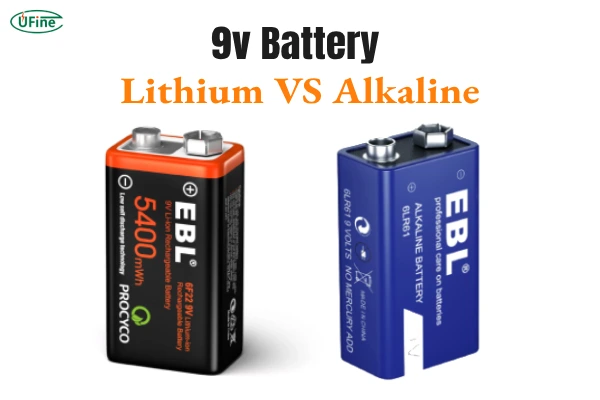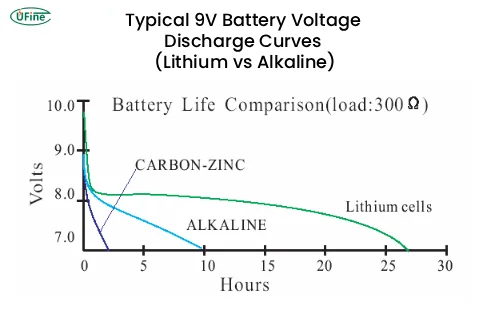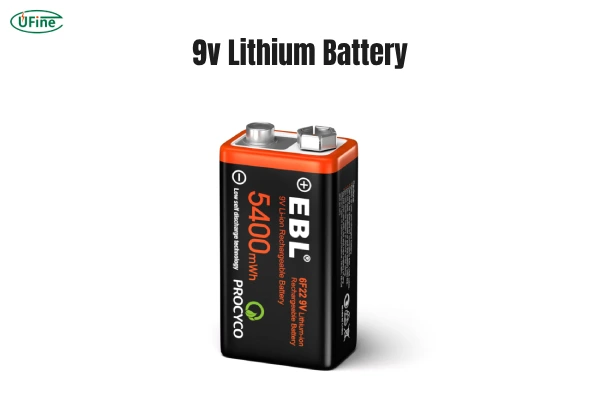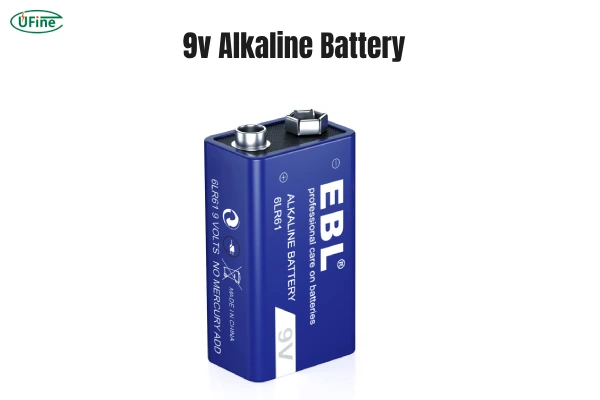
When you’re staring at a shelf full of 9V batteries, it’s easy to feel like they’re all basically the same. But they’re not. And picking the wrong type can mean shorter runtimes, annoying battery‑change routines, or even device malfunctions.
Let’s break this down in a way that’s easy to understand — no overly technical jargon, just the facts you actually care about.
Key Takeaways
- Lithium 9V batteries are generally more reliable for critical and high-drain devices thanks to longer lifespan, stable voltage output, and better performance in extreme temperatures.
- Alkaline 9V batteries still make sense for low-drain, everyday electronics where cost matters more than maximum runtime.
- The biggest real-world difference isn’t the labeled “9 volts,” but how long the battery can maintain usable voltage.
- Devices like smoke detectors, medical instruments, and outdoor sensors benefit far more from lithium than alkaline.
- Choosing the right 9V battery is less about brand loyalty and more about matching battery behavior to device needs.
Part 1. 9V Lithium vs. alkaline battery — At-a-glance comparison
Before diving into detailed explanations, the table below offers a high-level comparison between lithium and alkaline 9V batteries. It focuses on factors that most directly affect reliability and real-world usage.
9V Lithium vs. Alkaline Battery Comparison Table
| Comparison Factor | 9V Lithium Battery | 9V Alkaline Battery |
|---|---|---|
| Typical Capacity | ~1100–1200 mAh | ~550–650 mAh |
| Lifespan (in use) | Up to 3–5× longer | Shorter, especially under load |
| Voltage Stability | Very stable until near depletion | Gradually decreases over time |
| Performance in Extreme Temperatures | Excellent (−40°C to 60°C) | Limited (performance drops in cold/heat) |
| Weight | Lighter | Heavier |
| Shelf Life | Up to ~10 years with low self-discharge | Typically ~5 years |
| Best Device Types | Smoke detectors, medical devices, security systems | Remotes, clocks, basic radios |
| Upfront Cost | Higher | Lower |
| Long-Term Value | Often better due to fewer replacements | Depends on usage frequency |
At a glance, both battery types are 9 volts and fit the same devices. But the chemistry inside them is different.
- Alkaline batteries use zinc/manganese dioxide chemistry. They’re cheap and common.
- Lithium 9V batteries use lithium chemistry, which packs more energy into the same size.
That difference in chemistry affects how long they last, how steady the power stays, and how they handle heat or cold.
Part 2. Capacity
One of the biggest practical differences is capacity:
According to real performance data, typical lithium 9V batteries have around ~1200 mAh, while alkaline ones are usually ~550–650 mAh. That’s roughly double the capacity for lithium in many use cases.
What that means in everyday life:
- A lithium battery keeps powering a device for significantly longer before it runs out.
- An alkaline battery peters out sooner — especially in devices that draw a lot of current.
Part 3. Voltage stability
Figure: Typical voltage discharge curves of 9V lithium vs. alkaline batteries under continuous load. Lithium batteries maintain a relatively stable voltage for most of their usable life, while alkaline batteries experience a gradual voltage decline from the beginning.
Here’s something you don’t often hear about in spec sheets: voltage curve behavior.
Alkaline batteries slowly drop in voltage as they discharge. In contrast, lithium batteries tend to maintain a flatter voltage profile, holding close to 9V until the very end of their life.
This matters because many devices — like smoke detectors, carbon monoxide detectors, and wireless gear — are sensitive to voltage drops. When voltage declines too early, the device may warn you prematurely, behave erratically, or shut down sooner than it should.
Part 4. Temperature performance
Another place lithium batteries tend to outperform alkaline ones is in temperature extremes.
Most consumer alkaline batteries begin losing efficiency in cold or very hot environments. In contrast, lithium chemistry performs much better across a wide range of temperatures — from sub‑freezing garages to hot attics.
This doesn’t just matter for gadgets you forget about. Seasonal extremes can significantly shorten the useful life of alkaline batteries, while lithium ones keep going more consistently.
Part 5. Shelf life
If you buy a pack and stash it in a drawer, you probably want it to still be good a year later.
Lithium batteries generally have a longer shelf life and lower self‑discharge than alkaline. That means if you buy a couple of lithium batteries today and don’t use them until next year, you’ll still get most of their capacity. Alkaline batteries self‑discharge faster over time.
This is why many emergency device manufacturers recommend lithium cells for long‑term standby use.
Part 6. Cost
This is where alkaline still shines: cost.
You’ll usually pay more for a lithium 9V battery than an alkaline one. If all you care about is the lowest price per battery today, alkaline wins.
But if you think about cost per year of use, lithium often comes out ahead — especially in high‑drain or always‑on devices. A lithium battery that lasts 3–5 times longer can end up costing less per hour of useful power.
Part 7. Best use cases
Over the years I’ve developed a pretty simple rule of thumb:
Choose Lithium If:
- The device is critical (smoke/CO alarms, medical devices).
- The device runs continuously or unpredictably.
- You want to minimize battery changes.
- The environment sees temperature extremes.
Choose Alkaline If:
- The device is low‑drain (remote controls, clocks).
- Cost is tight and you don’t mind changing batteries more often.
- You’re powering something with intermittent use.
This approach isn’t based on brand hype — it’s based on how different chemistries behave in real world conditions.
Part 8. Rechargeability
A quick note that surprises a lot of people:
Most 9V lithium batteries you buy off the shelf are not rechargeable. They’re disposable. There are rechargeable lithium‑ion 9V batteries, but they behave differently (different nominal voltage, need a specific charger) and are less common.
So: if you’re specifically looking for rechargeable 9V batteries, check the packaging — “lithium‑ion rechargeable” or “NiMH rechargeable” — and understand that they’re a slightly different product category.
Part 9. Recommended 9V battery brands & models
Not all 9V batteries are created equal — even within the same chemistry.
This table compares popular, widely used 9V battery models across five practical dimensions that actually affect real-world reliability, rather than just marketing claims.
The goal isn’t to crown a single “best” battery, but to help match the right battery to the right device.
| Brand & Model | Chemistry | Typical Capacity* | Voltage Stability | Temperature Performance | Best For |
|---|---|---|---|---|---|
| Energizer Ultimate Lithium 9V | Lithium | ~1200 mAh | Excellent (very flat discharge curve) | Excellent (−40°C to 60°C) | Smoke detectors, CO alarms, critical devices |
| Ultralife Lithium 9V (U9VL) | Lithium | ~1200 mAh | Excellent | Excellent (industrial-grade) | Medical devices, security systems, long-term backup |
| ACDelco Lithium 9V | Lithium | ~1100–1200 mAh | Very good | Very good | High-drain electronics, professional use |
| Duracell Procell 9V | Alkaline | ~600 mAh | Good (gradual drop) | Moderate | Professional low-drain equipment, bulk use |
| Energizer MAX 9V | Alkaline | ~550–600 mAh | Good | Moderate | Household electronics, radios, meters |
| Rayovac Fusion 9V | Alkaline (High-Performance) | ~600 mAh | Better than standard alkaline | Moderate | Higher-drain household devices |
*Capacity values are approximate and based on manufacturer data and independent testing averages. Actual runtime varies depending on device load and usage pattern.
What This Table Really Tells You
Before You Buy 9V Battery Must-Knows
A few patterns become clear when looking at these batteries side by side:
First, lithium 9V batteries consistently deliver higher usable capacity and maintain near-constant voltage until the end of their life. This makes them ideal for devices that rely on voltage stability to function correctly.
Second, alkaline batteries remain a sensible choice for low-drain, non-critical devices, especially when cost matters more than maximum lifespan.
Finally, temperature tolerance is often overlooked. Devices installed in garages, outdoors, or unconditioned spaces tend to perform far more reliably with lithium batteries.
Quick Recommendation Based on Use Case
- “Install it and forget it” devices: Lithium
- Safety-critical equipment: Lithium
- Everyday household electronics: Alkaline
- Professional bulk use: Industrial alkaline or lithium, depending on load
- Extreme temperature environments: Lithium
Part 10. FAQs
Q: Why do some people insist alkaline is “good enough”?
A: For many low‑drain or rarely used devices, the performance difference doesn’t matter much — and alkaline is cheaper upfront.
Q: Is there any device that must use lithium?
A: Very few devices will break on alkaline, but critical devices where you want reliable long life often recommend lithium. Always check manufacturer guidelines.
Q: Should I mix battery types?
A: Never mix lithium and alkaline in the same device — different discharge curves and chemistry can lead to poor performance or even damage.
Related Tags:
More Articles

Battery Boosters: How They Work and Choosing the Best
What is a battery booster? Learn how battery boosters work, key types, applications, and how to choose the right booster battery for vehicles and equipment.
Top Rated 18650 Batteries In 2026: Expert Recommendations
Compare top rated 18650 batteries in 2026 by capacity, discharge rate, and use. Expert recommendations on choosing reliable 18650 cells and battery packs.
Ternary Battery or LFP Battery: How to Choose for EV?
Compare ternary lithium battery vs LiFePO4 for EVs. Learn differences in range, safety, cost, cycle life, and which battery suits your driving needs.
Top 10 Lithium Motorcycle Batteries for Optimal Performance
Compare the best lithium motorcycle batteries for 2026, including LiFePO4 vs lead-acid, lifespan, CCA ratings, cold-start performance, and expert buying tips.
Group 35 Battery Size, Type & Best Options for Your Car (2026 Guide)
Discover the complete group 35 battery guide with detailed size charts, battery types, pricing, applications, and recommended brands for your car in 2026.






